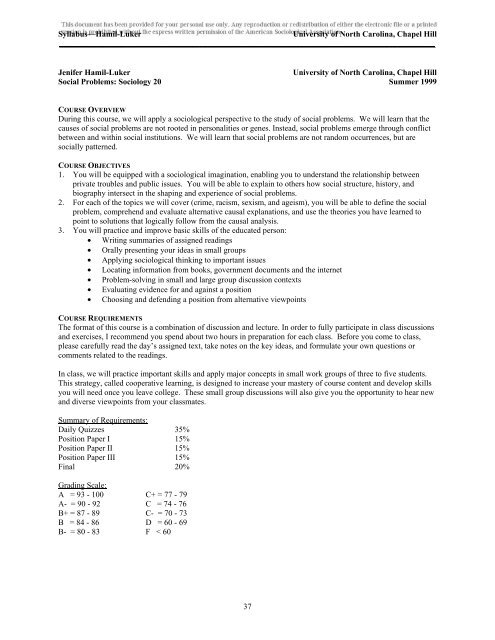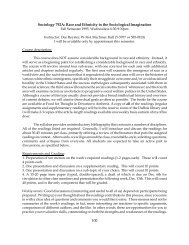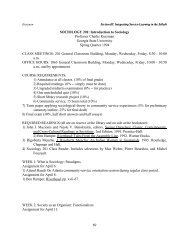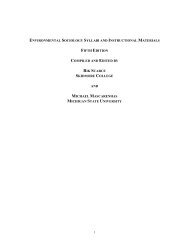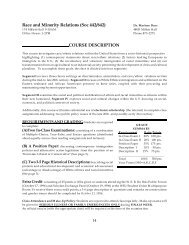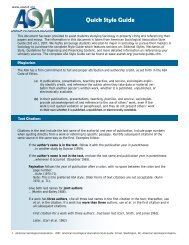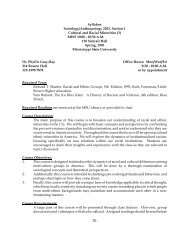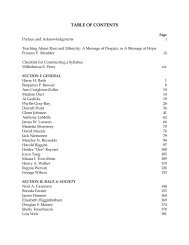Social Problems - American Sociological Association
Social Problems - American Sociological Association
Social Problems - American Sociological Association
You also want an ePaper? Increase the reach of your titles
YUMPU automatically turns print PDFs into web optimized ePapers that Google loves.
Syllabus—Hamil-Luker University of North Carolina, Chapel Hill<br />
_____________________________________________________________________________________________<br />
Jenifer Hamil-Luker University of North Carolina, Chapel Hill<br />
<strong>Social</strong> <strong>Problems</strong>: Sociology 20 Summer 1999<br />
COURSE OVERVIEW<br />
During this course, we will apply a sociological perspective to the study of social problems. We will learn that the<br />
causes of social problems are not rooted in personalities or genes. Instead, social problems emerge through conflict<br />
between and within social institutions. We will learn that social problems are not random occurrences, but are<br />
socially patterned.<br />
COURSE OBJECTIVES<br />
1. You will be equipped with a sociological imagination, enabling you to understand the relationship between<br />
private troubles and public issues. You will be able to explain to others how social structure, history, and<br />
biography intersect in the shaping and experience of social problems.<br />
2. For each of the topics we will cover (crime, racism, sexism, and ageism), you will be able to define the social<br />
problem, comprehend and evaluate alternative causal explanations, and use the theories you have learned to<br />
point to solutions that logically follow from the causal analysis.<br />
3. You will practice and improve basic skills of the educated person:<br />
• Writing summaries of assigned readings<br />
• Orally presenting your ideas in small groups<br />
• Applying sociological thinking to important issues<br />
• Locating information from books, government documents and the internet<br />
• Problem-solving in small and large group discussion contexts<br />
• Evaluating evidence for and against a position<br />
• Choosing and defending a position from alternative viewpoints<br />
COURSE REQUIREMENTS<br />
The format of this course is a combination of discussion and lecture. In order to fully participate in class discussions<br />
and exercises, I recommend you spend about two hours in preparation for each class. Before you come to class,<br />
please carefully read the day’s assigned text, take notes on the key ideas, and formulate your own questions or<br />
comments related to the readings.<br />
In class, we will practice important skills and apply major concepts in small work groups of three to five students.<br />
This strategy, called cooperative learning, is designed to increase your mastery of course content and develop skills<br />
you will need once you leave college. These small group discussions will also give you the opportunity to hear new<br />
and diverse viewpoints from your classmates.<br />
Summary of Requirements:<br />
Daily Quizzes 35%<br />
Position Paper I 15%<br />
Position Paper II 15%<br />
Position Paper III 15%<br />
Final 20%<br />
Grading Scale:<br />
A = 93 - 100 C+ = 77 - 79<br />
A- = 90 - 92 C = 74 - 76<br />
B+ = 87 - 89 C- = 70 - 73<br />
B = 84 - 86 D = 60 - 69<br />
B- = 80 - 83 F < 60<br />
37


